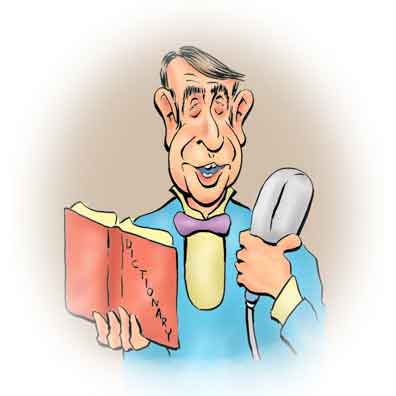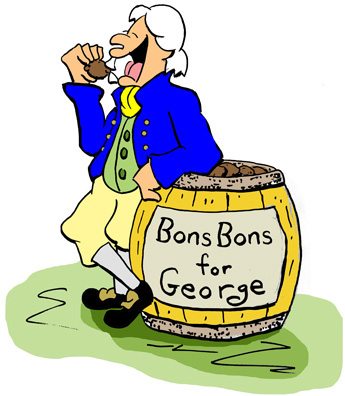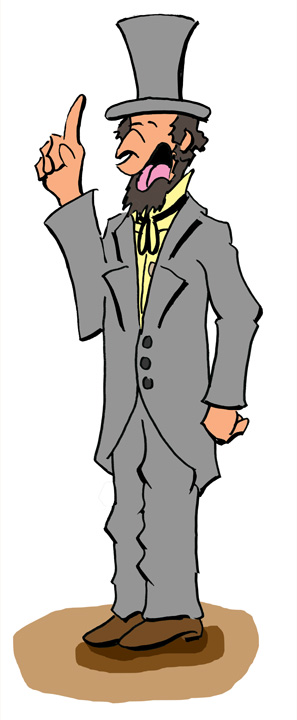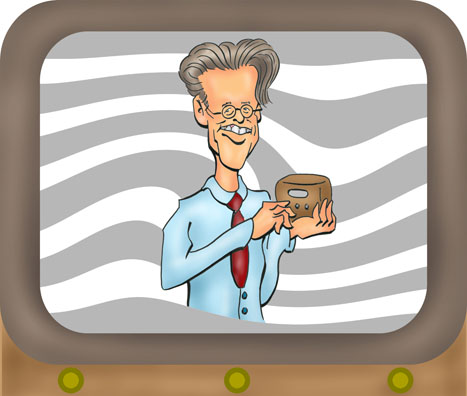This is
How-ard Co-sell

Part of Americana ...
There was a newspaper columnist - who was once mentioned in the James Bond novel Diamonds Are Forever - who sardonically wrote that Howard Cosell was the sportscaster who "changed his name and put on a toupee1". Obviously the toupee was to cover a bald spot, and we suppose the moniker switch was because "Cosell" had a ring to it that was well-suited for a broadcasting career.
Footnote
The wording of the quote varies with the tellings and is inevitably given second hand. So you wonder if it's really authentic.
But regarding Howard's famous toupee, evidently he wore it only for the broadcasts. He kept it in his pocket and put it on just before he went on camera. And you can find film clips of Howard without any artificial tonsorial adornments.
Soddy, old chaps. It was as a law student at New York University that young Howard William Cohen, the son of Jewish Polish immigrants, legally changed his name. The name was, in fact, an Americanization of the original family name, Kožel2. And it was the officials at the desk when his folks passed through Ellis Island who changed the name. So the sneer of the famous sportswriter (who most people have forgotten) is not correct. Instead Howard changed his name back - and a là Americain.
Footnote
The truth is no one is quite sure how the name was actually spelled. Howard said it was just Cosell but spelled with a "K". Other family members mentioned the variants Kozel or Kassell. However a search of Polish surname data bases suggests that Kožel is the most likely Polish Ashkenazic name which in America became Kozel, Kassell, Kosell, or Cosell.
Howard started practicing law after he graduated but almost immediately went into the army for the duration of World War II. After his discharge (he reached the rank of major) he returned to a law practice.

... like George ...
As a Manhattan lawyer Howard was making $25,000 to $30,000 a year - very good pay in the late 1940's - when he met Mary Edith Abrams. They decided to get married.
Emmy (as everyone called her) came from a well-to-do family - a well-to-do Episcopalian family, mind you. Those were also the days when so-called "mixed marriages" were frowned on by all concerned (except probably by the bride and groom). So when Howard told his folks he was going to marry a shikse (שיקסע) - a non-Jewish woman - his mother said she'd kill herself.
"Go ahead, Mother," Howard replied.
The marriage was an extremely happy one and Howard and Emmy's kids told how their dad was not the hard pushing inquisitor when he was at home. Instead, he was quiet and easy-going and relaxed3.
Footnote
Emmy liked to travel with Howard on his trips and Howard liked Emmy to come along. So given how much Howard was going from city to city and even country to country, theirs was a happy marriage but also a hectic one.
Going to law school had been in deference to his parents' wishes. But Howard had really wanted to get into sports broadcasting. As to why, he told a friend, "Most of these guys in this [sports reporting] field are !'s."
"Then you'll be the top ! of them all," his friend replied.
Fortunately as a fancy pants New York attorney who specialized in union law, he had the right contacts for achieving his goal. He represented a number of sports figures, including Willie Mays, and one of his pro bono clients was the Little League.
So depending on which source you believe, in 1953 Howard either asked a radio executive to let him host a sports program (for no pay) or a radio executive asked Howard to host a sports program (for no pay). Called "Speaking of Sports", it was not your run of the mill broadcast and instead featured a panel of Little League players who would interview major league stars.
After three years, the show and Howard caught the attention of the ABC bigwigs. So with Howard now getting paid a salary, he could chuck the law altogether. He soon began working as a sports reporter and anchorman for New York's ABC affiliate, WBAC-TV. Emmy not only acquiesced with Howard's career change but was completely d'accord with it.
It's ironic that Howard, who became the most famous sportscaster of his time, came to the national network by announcing a sport that at the time was in such a decline that in 1963 one writer postulated it would be banned by 1968. That was boxing.
The sweet science was the perfect sport for Howard. Even at that early date, it was an asset if announcers had chiseled features and spoke with clear Midwestern diction. On the other hand a boxing announcer with a New York accent, a staccato nasalic speaking style, and (we must admit it) a pugilistic appearance could appeal to that particular audience.
It helped that Howard seemed to know what he was talking about and was particularly sympathetic to the amateur boxers and their promoters. Howard knew that the best fighters usually came from impoverished families, and the sport gave them a route to wealth and fame. And in a sport where fighters were often referred to as hams, lugs, and bruisers, he treated them with respect.
Howard was the first sports announcer to address Muhammad Ali by his Muslim name rather than his birth name of Cassius Clay. He was also one of the few white men - not to mention sportscaster - to defend Ali's stand that as a Muslim minister, he should be exempt from the draft. So when Ali was arrested for refusing to be inducted, Howard maintained that he should be granted the exemption like any other religious leader. Later the Supreme Court reversed the earlier court's decisions and unanimously agreed with Howard4.
Footnote
A little known aspect of this case was that in its initial vote the Supreme Court ruled 5-3 against Ali (Thurgood Marshall, the only black justice on the court, had recused himself because he had been involved in the case before he was appointed to the court).
However, after Justice John Harlan began writing the majority opinion and researching the religious issues, he had second thoughts and soon reversed his vote. Eventually the other justices agreed except for Chief Justice Warren Burger. So there were enough votes to carry the day for Ali. But almost at the last minute Burger agreed to accept the new majority's opinion. So the unanimous decision for Muhammad Ali had almost been a reaffirmation of his conviction!
But Howard really became part of the American Collective Sports Consciousness when he was trebled with former Dallas quarterback Don Meredith and New York Giants running back Frank Gifford5 on Monday Night Football. Describable with pardonable exaggeration and splendid ambiguity as "Two Jocks and A Shock", Monday Night Football was the brainchild of ABC executive Roone Arledge, who personally picked Howard to sit in the booth. The show began broadcasting in 1971 and became the most popular program on nighttime television. The show is still on.
Footnote
Frank joined the broadcast on its second season, replacing broadcaster Keith Jackson. Keith was best known for his college football announcing, and was called in because Frank had a year to go with a contract on CBS. Keith later joined Howard and Don Drysdale for the 1979 World Series. Keith called the play-by-play and Howard and Don added color.
To all appearances the Tremendous Trio bantered affably - Frank specializing in play-by-play, Don providing the color of a professional player, and Howard adding intellectual augmentation. But despite their outward affability, Howard thought he was put on a bit by the other twain and later spoke rather disparagingly about former players who become commentators. He was not opposed to players becoming announcers in principle, mind you, but he felt that too often they played on their name and relied on trite and hackneyed phrases to get them through the broadcasts. Among the "bromides" and "clichés" Howard exampled were:
It's a mismatch, fans.
Turnovers will kill you.
You can't let them get away with that.
Dropped passes will kill you.
He came to play.
They dodged a bullet on that play.
They dodged a major bullet on that play.
What moves!
Missed tackles with kill you.
We're not quite sure if we can agree with Howard. Both Don - whom Howard would refer to as "Dandy Don" (to Don's increasing irritation) - and Frank brought intelligence and insight to the games. Drawing on their playing experience, both men could explain the action on the field, point out why a coach had made certain decisions, and elaborate why a particular rule was important for a play. So Frank and Don were clearly as responsible for the quick success of the show as Howard.
Besides, we have to admit it. All sports announcers - or any kind of announcers - use verbal "fillers" in real time broadcasts. In fact, Howard himself could interject banalities like:
I tell you there's no quitting this kid and there's no quitting this team.
Not a bad first down gain.
He really bulled his way in.
That's a biggie, too.
Look at 'em go, Don!
And that's during just one quarter!

... and Abraham ...
It's a surprise that the trio which made Monday Night Football an American institution evaporated so quickly - and with some impetus from Howard. Howard liked to tweak Don's nose in other ways than calling him Dandy Don. Once he asked Don if he knew which professional quarterback had the most fumbles in a game. Don didn't know until Howard told him it was Don Meredith6.
Footnote
Despite the fact that Don's butter fingers were mentioned by Howard, recent reference works that list most-fumbles-per-game don't mention Don at all.
The most fumbles in a single season for Don was 16 in 1964. At the time this was a record but has since been surpassed. That year the most turnovers in a game for Dallas (not necessarily just fumbles and not necessarily just by Don) was five on November 8 when Dallas played the New York Giants in New York.
Don had left the show in 1973 to become color commentator to Curt Gowdy on NBC. Howard's reaction was not particularly gracious. "He couldn't stand being second banana to me," Howard snorted. "Dandy Don doesn't want to be Dandy Don any more. Doesn't want to be what he is." We're not sure what Howard thought Don wanted to be or what he was.
As the 1970's rolled along, Howard was not just one of the most recognized celebrity sportscasters, he was one of the most recognized celebrities, period. In fact, you can argue he had become as much a part of American culture as George Washington, Abraham Lincoln, and Philo Taylor Farnsworth.
Adding to Howard's iconicity was that he was perfect for parody. In Woody Allen's film, Sleeper, there's a scene which showed a film clip of Howard giving commentary. The scientists of the future said they had believed the film was shown to prisoners to force them to confess7. Ironically for someone so perfect for satire, Howard was not a widespread subject of the professional impersonators of the era like Rich Little, David Frye, and Frank Gorshin. He was simply too easy.
Footnote
Howard and Woody were pretty good friends, and Howard appeared as himself in two scenes in Woody's film, Bananas.
But signs, like the times, were a-changin', and the ABC executives increasingly found that Howard was - as we say today - "polarizing". That means that some people liked him and some people didn't.
Howard often drew the ire of sports fans by his blunt criticism of popular athletes and his questions which seemed intended to goad. When he was interviewing an athlete you might expect Howard to ask things like, "Joe, people are saying you're not playing very well because you're old, washed up, and just can't compete with the younger men on the team. What do you say about it?"
Antipathy toward Howard began to get out of hand. Viewers wrote to ABC to yank him from the air. Some bars would let people throw bricks through television sets when Howard was on. Howard began receiving hate male which was vituperative and anti-Semitic and even threatening.
It got to the point where armed guards would sometimes escort Howard into the stadiums where he made his broadcasts. The most frightening episode was after the sixth game of the 1979 World Series between the Pittsburgh Pirates and the Baltimore Orioles. As Howard and Emmy got into a limousine, they were surrounded by a hostile crowd of Orioles fans (Pittsburgh had won the game) who began shouting epithets and rocking the car back and forth. Police had to come to his rescue.
Ironically it wasn't rising opposition to Howard that started his exodus from the airwaves but a decision of his own. On November 26, 1982, he was announcing the fight where Larry Holmes was defending his heavyweight title against Randall "Tex" Cobb. Larry was favored 8-1 and Tex was being slaughtered. "This is as brutal a mismatch as I think I've ever seen", Howard said, and kept asking why the referee didn't stop the fight. "Doesn't he know," Howard asked, "that he is constructing an advertisement for the abolition of boxing?" The fight ended after fifteen rounds with a massively lopsided decision for Larry.
Tex later claimed he wasn't hurt and it looked worse than it was (the referee had in fact paused the action more than once to ask Tex if he was OK). But Howard refused to broadcast any further boxing matches. When Larry was told that his fight with Tex was what drove Howard out of boxing, Larry said he couldn't imagine a greater gift to mankind.
For decades, the American Medical Association has called for the abolition of boxing as it's the one sport where the actual goal is to injure the opponent. In fact the rules permit a win by a knockout which is not only a medical trauma that can cause permanent brain damage but is also the way a winner is most unambiguously determined. If the safety of the fighters is to be paramount, you would think blows to the head should be prohibited and a fighter who scores a knockout should be immediately disqualified and designated the loser.
Eventually Howard agreed with the AMA that boxing should be abolished. But he was also realistic enough to know boxing would never be banned in the United States. And it never has.
Then in 1983 a furor was started on Monday Night Football when Howard used what some thought was a racially insensitive remark about a young football player. Actually Howard had unwittingly used a word that he jokingly applied irrespective of race to young people, including his grandchildren. Clearly embittered by the accusations of racism, he soon left the show and published his memoir I Never Played the Game.

... and Philo?
Most reviewers commented on Howard's harsh opinions towards his colleagues, many of whom had contributed to his success. The principals themselves were surprised at Howard's negativity and how even his compliments were a prelude to a sideswipe. But as far as Howard was concerned, he was - to use his catch phrase - "telling it like it is."
Some, though, thought Howard was telling it like it ain't, and the book gave much fodder to those whose second favorite pastime is psychoanalyzing people they don't like. Why surely, the amateur Freuds mused stroking their collective beards, such an egotistical, arrogant, and self-centered individual was masking his own deep-seated insecurities and self-doubt about his own abilities. Clearly, they nodded, Howard was losing it.
Particularly at variance with majority opinion was Howard's dismissiveness toward both Don and Frank. Howard later said he didn't think Frank was the best play-by-play man (he thought Curt Gowdy was) and he would be dishonest to say otherwise. Well, saying who's the best sports announcer is as undecidable as Gödel's Theorem. But if Frank wasn't the best - he was on Monday Night Football for 27 years and didn't retire until 1998 - he was certainly very good.
During his career Howard was involved with a catholicity of sports: boxing, baseball, football, the Olympics. You name it, Howard announced it. And in 1978, Howard was the moderator when pool greats Willie Mosconi and Rudolf Wanderone Jr. - who had assumed the name Minnesota Fats - competed in the - quote - "Great Pool Shootout" - unquote. Actually for a while it was amusing enough with Fats's typical haranguing of Willie. But after a while Fat's banter got to be a bit much even for Howard. At one point he patted Fats's considerable paunch and asked him to be a good boy. Willie, by the way, bested Fats easily, winning the triple gamed match with Nine Ball (5-3), Eight Ball (5-2) and Rotation (5-2).
After Monday Night Football Howard continued to work on television. He appeared on CBS Sunday Morning News, a show called Saturday Night Live (not to be confused with a later show of that name which was at first simply called Saturday Night), and Sports Beat, a television news "magazine".
But with the release of I Never Played the Game and having offended virtually everyone who had anything to do with the networks, Howard was suddenly persona non grata on the television. Soon the inevitable articles and books about Howard took their own shots at him, claiming (among other things) that Howard not only wore a toupee, but was egotistical, obnoxious, insecure, and drank too much.
We certainly have to admit that Howard sometimes stepped beyond the bounds of good taste and said things that today which have would landed him - as the Sheriff of Boone County said - in a heap of trouble. When he first met the pioneering woman sports journalist Lesley Visser, he said "Let's have a look. Open your coat."
"Fine," Lesley responded. "Take off your rug."
That ended the conversation.
The truth is that after his departure from Monday Night Football, for all practical purposes Howard disappeared from the screen. He did, though, broadcast radio programs which could be made from his own apartment or from his home in Pound Ridge.
Although he had appeared as a satirical representation of himself in Woody Allen's Bananas, Howard seems to have become quite sensitive to the fact that he was now a figure of jest. A producer once approached him with the idea of making a Saturday morning cartoon show where the characters would be Howard, Frank, and Dan.
"Young man," Howard replied, "do you known whom you're speaking to? I am the biggest name in show business today. And you want to make a cartoon character out of me?"
Actually we can't say Howard was the biggest name in show business but he was still pretty big. He was paid over one million dollars8 a year and received sizable fees - thousands of dollars - to give talks. When asked if he, other broadcasters, and sports figures were paid too much, Howard said:
We're all paid too much in terms of inherent value to society. None of us contributes what a teacher does, what a nurse does, what a medical researcher does. So, of course, we're all overpaid. But that's the way it is in a free enterprise system.
With few broadcast venues available, Howard began writing for newspapers. He had always been down on print journalists who he thought were down on him. So naturally one paper's headline blared how Howard had "joined the enemy. But his days as a newspaperman lasted only a couple of years.
Looking for new horizons, Howard thought about running for Senate (he didn't). Then he contacted Roone Arledge about hiring him as a news anchor (Roone declined).
But no one could always be negative about Howard, and in his later years, he began receiving honors and accolades. David Halberstam, author of The Best and the Brightest and who had written what can only be called an unflattering article about Howard in Playboy magazine, said Howard was in the Top 50 sports announcers of all time.
In 1993 Howard was elected to the American Sportscasters Hall of Fame and the National Sportscasters and Sportswriters Hall of Fame. Howard was also selected for the International Jewish Sports Hall of Fame, and the Howard and Mary Edith Cosell Center for Physical Education at Hebrew University in Jerusalem is (obviously) named after Howard and Emmy.
Howard was a longtime smoker of cigars, which even if not inhaled don't help cardiovascular fitness. He did have a significant heart problem which he kept secret from the public. But on April 23, 1995, when he died from a cardiac embolism - that is, solid material that travels through the circulatory system to the heart - it was likely due to joint disease.
References
Howard Cosell: The Man, the Myth, and the Transformation of American Sports", Mark Ribowsky, W. W. Norton and Company, 2012.
"Howard Cosell", American Sports: A History of Icons, Idols, and Ideas, 4 Volumes, Murry Nelson (Editor), ABC-CLIO, 2013.
I Never Played the Game, Howard Cosell with Peter Bonventre, William Morrow and Company, 1985.
"Howard Cosell", The Famous People, 1999.
"Remembering Howard Cosell: Why Did He Become So Disillusioned With Sports?", Ryan Glasspiegel, The Big Lead/NFL, April 14, 2015.
"Polish Last Names", Family Education.
"Don Meredith", Pro-Football Reference.
For Football Fans Only", Jack Savercool, The New York Times, October 13, 1974.
"Steel", Rod Serling (Narrator), Lee Marvin (Actor), Joe Mantell (Actor), Don Weis (Director), Richard Matheson (Writer), The Twilight Zone, CBS, October 4, 1963, Internet Movie Database.
"Sports of the Times: Cosell Says, 'I've Had It.", George Vecsey, The New York Times, December 6, 1982.
"Howard Cosell - Telling It Like It Is", Home Box Office, 1999.
Cosell: He Told It Like It Was", Dave Kindred, The Los Angles Times, March 26, 1995.
"Boxing's Odd Couple: Muhammad Ali and Howard Cosell", Jon Saraceno, USA Today, June 4-5, 2016.
"The Characters Of Boxing: Tex Cobb", Bleecher Reports, Dan Boone, February 12, 2009
"Trapped in an Elevator with Howard Cosell", Robert Daley, The New York Times, September 1, 1974.
"The Imitable Howard Cosell", Paul Farhi, The Washington Post, January 11, 2002.
"Cosell's Message Lost in Himself", Mike Downey, Los Angeles Times, April 24, 1995.
The Brethren: Inside the Supreme Court, Bob Woodward and Scott Armstrong, Simon and Schuster, 1979.
"Mosconi & Fats, The Great Pool Shoot-Out", Sports History Weekly, January 27, 2019.
Chicago Bears vs. Cleveland Browns", Monday Night Football, November 3, 1980, ABC Sports.